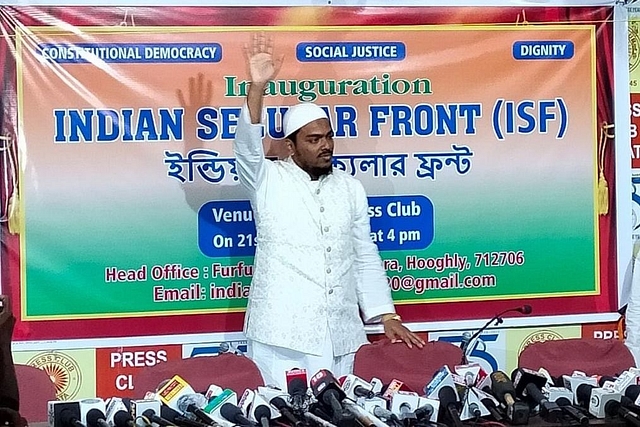
Battleground Bengal: How The Congress-Left Combine May Have Scored A Self-Goal By Aligning With An Islamic Party
As it stands now, the Muslim vote is most likely to get divided between the Congress-Left-ISF gathbandhan and the Trinamool.
And that is sure to work to the advantage of the BJP in many constituencies.
The newly-formed Congress-Left alliance in Bengal has started seat-sharing talks with the fledgling Indian Secular Front (ISF) formed by Muslim cleric Abbas Siddiqui.
The sole intention of the Congress-Left combine of including the Islamic party in their gathbandhan is to corner the Muslim vote in some parts of south Bengal.
Siddiqui, a pirzada at Furfura Sharif, a Sufi shrine in Hooghly district that is revered by Bengali-speaking Muslims, floated the ISF in end-January.
The Congress-Left combine was initially hesitant on including the ISF in its alliance. However, electoral compulsions motivated the two, who have had no qualms in aligning with the radical Muslim League in Kerala, to shed their inhibitions.
But this tie-up with the ISF, say political observers, will cost the Congress-Left combine very dear.
For one, the influence and appeal of the 34-year-old Siddiqui is limited to only some pockets in the four South Bengal districts of North and South 24 Parganas, Howrah and Hooghly.
“Only young Muslim men and youth are likely to be influenced by him. He is a good speaker, but many Bengali-speaking Muslims believe that pirzadas should not delve in politics,” said Syed Imran Hussain, a researcher in minority affairs with Calcutta University.
Also, Abbas Siddiqui is very junior in the large clan of pirzadas of Furfura Sharif, and his uncle Toha Siddiqui is firmly with the Trinamool.
Though Abbas Siddiqui proclaims that his party represents the interests of Dalits, tribals and Muslims, an assertion repeated by the Left, there is no fooling the electorate that it is an Islamic party that primarily represents the Muslims.
At a press meet recently, CPI-M politburo member Mohammad Salim pointed out that ISF chairman is a tribal (Sibu Soren) and that the party’s office-bearers include other tribals and Dalits too.
But, as even Hussain points out, such token representation of other communities is unlikely to cut any ice among the politically-conscious electorate of Bengal.
Given the fact that Abbas Siddiqui’s influence is limited to only a section of Bengali-speaking Muslims in the four south Bengal districts, it is doubtful if the ISF can make a major impact even in Muslim-majority constituencies of these districts.
Abbas Siddiqui had earlier planned to enter into an electoral alliance with Asaduddin Owaisi’s All India Majlis-e-Ittehadul Muslimeen (AIMIM), but those plans are on the backburner now due to opposition from the Congress-Left combine.
The Congress-Left combine feels that Owaisi is too Islamist for its liking and any link, direct or indirect, with the AIMIM will allow its political rivals (the BJP and the Trinamool) to portray the combine as ‘communal’.
But the Congress-Left combine need not have worried and been wary of its ally (the ISF) associating with the AIMIM. Its association with the ISF will be enough to attract charges of playing footsie with Islamists for electoral gains.
“The ISF will hardly be viewed as a secular party. It is an Islamic party and will be painted as such,” said senior Trinamool leader Arup Biswas.
As elections draw near, the attacks on the Congress-Left combine for joining hands with an Islamist party will only grow more intense.
That will polarise the Hindu voters against the combine and in favour of the BJP, say political observers.
The BJP is sure to highlight the Congress-Left’s association with the ISF to consolidate the Hindus against the gathbandhan (Congress-Left-ISF). The Trinamool will also not shy away from attacking the Congress-Left combine for joining hands with a political outfit floated by a Muslim cleric.
It would have made political sense for the Congress-Left combine to risk all these charges and criticism if the electoral arrangement with the ISF yielded rich dividends.
But there are grave doubts about the dividends, if any, the arrangement will yield. As has been said earlier, Abbas Siddiqui has a following only among a section of young Muslim men in the four south Bengal districts.
And many Bengali-speaking Muslims believe that clerics and pirzadas (custodians of shrines) should not engage in political activities.
Also, a significant section of Bengali-speaking Muslims who have come under the influence of hardline Salafi Islamist preachers in recent years look on Sufi shrines and pirzadas as apostate and will not vote for the ISF.
It would have made sense for the ISF to enter into an alliance with the AIMIM, as it had originally planned to. Owaisi has a large following among the Urdu-speaking Muslims in and around Kolkata as well as Uttar Dinajpur and Malda districts adjoining Bihar.
Apart from Urdu or Hindi-speaking Muslims, Owaisi also has a following among Bengali-speaking Muslims. It would thus make more sense for Abbas Siddiqui to align with Owaisi and consolidate Muslim votes in favour of an ISF-AIMIM combine.
As it stands now, the Muslim vote is most likely to get divided between the Congress-Left-ISF gathbandhan and the Trinamool. And that is sure to work to the advantage of the BJP in many constituencies.